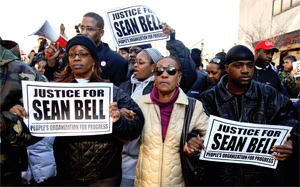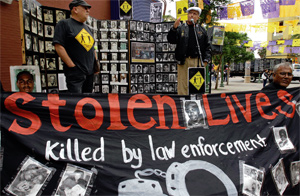ERICTOUREM -Contributing Writer-
U.S. defense on human rights record is historic, but how much impact will review have on justice?

ATLANTA (FinalCall.com) – At The Final Call press time, an American delegation of 33 members–possibly including United States Attorney General Eric Holder and U.S. Ambassador to the United Nations Susan Rice–were en route to Geneva, Switzerland to appear before the United Nations Human Rights Council and for the first time in history to review America’s human rights record, her practices and how her human rights practices can be strengthened and brought in line with international standards.
The United States has most often been on the accusatory side of the human rights debates, calling out the shortcomings of others abroad while denying rights violations exist at home.
The Universal Periodic Review (UPR) was created through the UN General Assembly in 2006 by a UN resolution that also established the Human Rights Council.It is a cooperative process which, by 2011, will have reviewed the human rights records of every country.Currently, no other universal mechanism of this kind exists. The UPR is one of the key tools of Human Rights Council, which reminds countries of their responsibility to fully respect and protect all human rights and fundamental freedoms.The ultimate aim of the review is to improve human rights in all countries and address rights violations wherever they occur.
A lottery drawing resulted in the U.S. appearance in Geneva and though human rights groups and nations have repeatedly appeared before the world body and have summoned America, this is the first time she has agreed to participate.
“It’s really important–especially here in the United States” for government involvement, State Department spokeswoman Nicole Thompson told The Final Call. “Because we are the United States of America (and) for a number of countries we set the example. We still hold the standard. It is important that we take a look at ourselves, because we can always improve. We have come a very long way in this country, but there is still far to go and there are always areas for improvement,” she said.

The UPR involves a review of the human rights records of all 192 UN Member States once every four years.The review provides the opportunity for each country to declare what actions they have taken to improve human rights and fulfill international obligations to respect rights. The UPR is designed to ensure equal treatment for every country when their human rights records are assessed.
“For the first time, the entire human rights record of the U.S. will be examined by the UN Human Rights Council on Nov. 5. So, this gives us the opportunity to raise a number of issues within the U.S.–outside the U.S.,” explained executive director Ajamu Baraka of the Atlanta-based U.S. Human Rights Network, in an exclusive interview with The Final Call from Geneva. “We have been raising them for years but we have not been able to generate the kind of attention that these issues require. So, what we have done is galvanize our forces, submitted reports to the UN; brought delegations here to lobby some of our friends in other governments to raise certain questions to the U.S. and now this week educate other organizations and delegations from other countries for what we believe to be the harsh realities of the U.S.,” he said.
Some harsh realities include the “insane” racially disproportionate U.S. prison population, with high incarceratioan rates for Blacks and Latinos as opposed to Whites. There are thousands of U.S. political prisoners America officially refuses to acknowledge, he said. There is also wanton police brutality and “hundreds of thousands of citizens walking the streets at night in America without a place to rest their heads”–as well as communities poisoned by corporate dumping of toxic waste and chemicals, Mr. Baraka continued.
Huge disparities also exist within the U.S. economy, the health care system and immigration policy. “We are raising very important and serious questions this week in hopes of becoming a part of the historic record with the realities that we all face in the country,” Mr. Baraka said.
Some activists feel taking U.S. misdeeds into the international arena may help with the future payment of reparations–others are not quite sure the appearance in Geneva will bring immediate results.
“The United States has been called to the UN Human Rights Council, but I am not so sure that the American government will officially recognize or acknowledge its role in denying civil and human rights around the world and even domestically,” said Chicago-based political analyst Bob Starks.
Mr. Starks told The Final Call the most glaring human rights violation ever was the enslavement of African people and the very foundation of this country was built on slavery. To admit those things would be a direct violation of why they say the country was built, he said.
“Therefore I don’t think it will be of any real consequence toward the correction of human rights on the part of the government. I mean, the government has always denied or simply not commented on any complicity to the violation of human rights,” said Mr. Starks.
“This is a country that was literally founded on slavery and genocide,” said activist Carl Dix of the Worker’s Communist Party, speaking by telephone from New York. “These are things that have remained in effect since the formation of this country. It is the wealth of this country and they enforce their position brutally.”
It is especially evident, Mr. Dix said, among the young, Black and Brown in inner cities. “The system tries to turn it around and blame it on the people saying, ‘Look at them. They are into violence, they are into drugs.’ But what they are trying to hide is the fact that they have sucked the jobs out of the inner cities of this country. They have wrecked the educational system and put our youth in a situation where there is no legitimate way to survive and raise families. So, whatever choice they make it’s going to put them in a bad situation.
“Either they are going to starve or they are going to get involved in some hustle. Then they will unleash their cops to beat them, arrest them or kill them,” said Mr. Dix, who has worked extensively on police brutality.
“Most of the country’s drug users are White, most of the people arrested for drug use are White, but by far, most of the people that go to jail for drug use are Black, even though Blacks represent a very small minority of the people arrested. Because the criminal justice system diverts Whites out before they are arrested, charged and tried, while, Black people get the book thrown at them,” he said.
The foundations of slavery and genocide will not allow America–even if she wants to come clean and make any meaningful contribution at the hearing, Mr. Dix argued.
Blacks and other human rights activists say the UN process may not be perfect, but it remains a pressure point for the U.S., which remains concerned about its image abroad. For example, China and Iran, in the past, are among countries that have cited American failures when their rights records were attacked.
International law also points to basic standards that countries are responsible for meeting and those remedies may be race-based or clearly targeted at disadvantaged groups, while affirmative in the U.S. has been eviscerated, they note.
It is going to be very difficult for the United States to paint a pretty picture, added Mr. Baraka.
As part of the UPR process, the U.S. government will have to address some elements contained in a 400-plus page report compiled by prominent U.S. civil and human rights organizations that include the NAACP, Amnesty International USA, the Center for Constitutional and Human Rights and the American Civil Liberties Union.
It gives an overview–unlike the report submitted in August by the U.S. government–of the disparities Blacks, Latinos and the Indigenous populations face within the United States, he said.
The U.S. delegates will appear before the UN body and read various parts of their report, then field questions from the human rights panel and member states. At the close of the session the Human Rights Council will offer written recommendations to improve human rights shortcomings and submit their findings to delegates on Nov. 9.
The U.S. will be given an opportunity to respond, but the recommendations will remain.
In the first part of 2011, the Human Rights Council puts the recommendations to a vote, then the U.S. is officially charged with working on meeting the recommendations.
“There are serious concerns in the U.S. I don’t think there is any way around that. The government is going to try to spin certain things, while others they might acknowledge certain issues and talk about what they are doing to address those issues, but I think there are certain issues that are so egregious that I don’t see how they are going to spin their way out of this. Especially in the light of critical questions we have raised that will be a part of the UPR process,” Mr. Baraka said.
“Doing this kind of objective, in-depth review, we have the opportunity to maybe unearth or take a look at areas we can improve,” conceded Ms. Thompson, of the State Dept.
“Human rights advocates have not only documented substandard human rights practices which have persisted in the U.S. for years, but also those that reflect the precipitous erosion of human rights protections in the U.S. since 9/11,” charged Sarah Paoletti of U.S. Human Rights Network, which only deals with human rights problems in America. Whether its migrant workers, children denied education, or women denied equal pay, “advocates feel compelled to bring their experiences before international human rights mechanisms because the U.S. legal system has fallen short,” she said.












